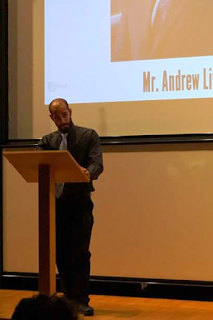We sat down with the playwright Sudhir Selvaraj to understand some of the background of the play and his motivations with writing it.
 |
| Sudhir Selvaraj, Playwright, 'We All Live in Bhopal' |
What motivated you to write this play?
I spent 8 days in Bhopal in 2011. I would consider myself relatively well-informed but when I was in Bhopal I realized how little I knew and unfortunately how comfortable I was not knowing. The longer I spent speaking with victims and activists, the more I felt uncomfortable. I returned home and kept reading not thinking anything would come of it. My research finally made me see intersections and connections within the tragedy and I knew I wanted to tell the story of Bhopal in a more compelling way than before. Hence, the play is very much written as a tale of my process. It tells the story of what I thought were the five most pivotal moments of the struggle and I even designed the narrator character to spur the audience to ask the questions I asked myself.
Why did you think it was an important story to tell?
I am drawn to conflicts. And no story better represents this. It is a very delicate story, deep and intersecting. I could spend a day and not fully explain the situation which is why I intentionally made the characters real people - activists, survivors, CEOs. I have curated and compiled the things they have said on numerous forums. In that sense this play is a work of oral history and giving voice to individuals who might not have any - creating an alternate narrative.
How did you go about obtaining accurate information while writing it?
The play mainly consisted of interviews and sessions with activists and survivors. I have been trained in research and learned how to discern my sources. I tried to be balanced and that's why I added the perspective of two CEOs. And this information is freely available and accessible to the public. The thrust of the play is to present the story and allow the audience to decide for themselves which position / side they are on.
What exactly do you want the audience to feel/think while experiencing it?
I would really want to allow people to know more about what happened. And this is not just a text book understanding of what happened but a deeper sense through sights and sounds of what people went through. I want them to know the stories beyond the headlines. Essentially, I want the audience to feel something. Anything really - whether that manifests as sadness, helplessness, anger, frustration, whatever.
Has the play had its intended effect? Are there any misconceptions you want to correct?
I am proud of the fact that we have had full houses every time we have done the play, with stimulating discussions following each performance. Actors and audiences have become advocates and spokespersons not only for the project but for the people of Bhopal as well.The script has proven as versatile as I had
hoped, for being performed for audiences in the UK, US and in India.
'We All Live in Bhopal' will be this Sunday, Feb 28th, at The Humming Tree, Bangalore. Click here to RSVP and get tickets.
The Renegade Arts and Theatre Society is also raising funds to aid The Chingari Trust; please visit our funding campaign to learn more.








